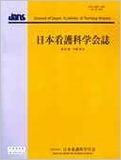Japanese
English
- 販売していません
- Abstract 文献概要
- 参考文献 Reference
要旨
目的:学齢期の発達障害児をもつ母親の推論の誤りと抑うつおよび養育態度との関連を明らかにした.
方法:学齢期の発達障害児をもつ母親473名に推論の誤り,抑うつ,養育行動に関する尺度の自記式質問用紙調査を行った.
結果:有効回答(率)は179部(37.8%)であった.母親の推論の誤りは,「選択的注目」に含まれる項目得点が高く,相談者がいない母親は,いる母親と比べ推論の誤りが強かった.「恣意的推論」「過度の一般化」「完全主義的思考」「選択的注目」の推論の誤りは,養育態度へ直接負の影響があったとともに,抑うつをきたすことで,さらに負の影響があった.つまり4つの推論の誤りが強く,抑うつ傾向である母親ほど,否定的養育態度を示した.
結論:看護師は,母親の推論の誤りをアセスメントし,学齢期の発達課題を達成し難い子どもを養育する母親の心情を理解し,母親が客観的に子どもの成長や養育態度を捉えられるような認知療法的な支援を行うことが求められる.
Objectives: This study aimed to investigate associations between thinking errors and depression, and between thinking errors and attitudes toward parenting, in mothers of school-age children with developmental disorders.
Methods: A self administered questionnaire survey with scales to measure thinking errors, depression, and attitudes toward parenting was conducted with 473 mothers of school-age children with developmental disorders.
Results: A total of 179 valid responses were collected (response rate: 37.8%). Among the items for mothers' thinking errors, scores were highest for “Selective attention”. Mothers who had no one to consult were more likely to have thinking errors than mothers who did have someone to consult. Thinking errors such as “Arbitrary inferences,” “Excessive generalization,” “Perfectionistic thinking,” and “Selective attention” were associated with greater levels of negative attitudes toward parenting and greater levels of depression. Mothers with a tendency to depression and a propensity for making these four thinking errors therefore exhibited negative attitudes towards parenting.
Conclusion: Nurses need to assess thinking errors of mothers, understand the feeling of mothers raising school-age children with difficulties achieving developmental tasks and provide cognitive therapeutic support, so that mothers can recognize both their children's development and their own attitude towards parenting.
Copyright © 2017, Japan Academy of Nursing Science. All rights reserved.


